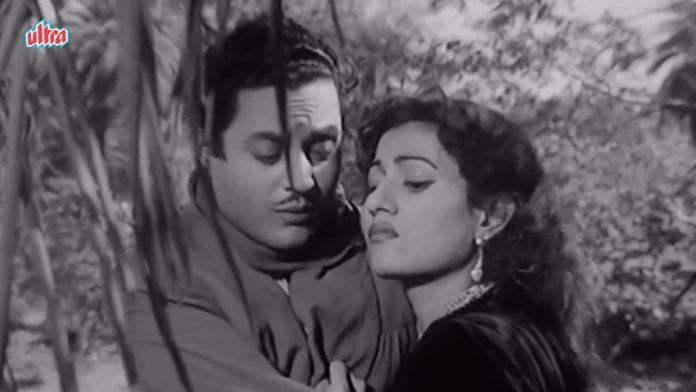New Delhi: The past week saw the death anniversary of one of Hindi cinema’s all-time greats, Guru Dutt. When the actor-director is spoken about today, it is mostly for movies such as Kaagaz Ke Phool, Chaudhvin Ka Chand, Pyaasa and Sahib Bibi Aur Ghulam. Today, we rewind to the 1955 smash hit, Mr. and Mrs. ’55.
Anita, a young heiress (Madhubala) stands to inherit Rs 7 million from her deceased father, but only if she marries within one month of her 21st birthday. This upsets her aunt Sita Devi (Lalita Pawar), a women’s rights crusader who has been fighting for the divorce bill to be passed (the movie gets its name from the year the Hindu Marriage Act was passed, by the way). She decides to hire a husband for her niece who agrees to divorce her when the money comes through. But the man she hires, Pritam (Guru Dutt), is already in love with Anita and she too begins to like him. What follows is a comedy of errors and miscommunication, with both Anita and Pritam thinking the other is only in it for the money.
When people talk about Mr. & Mrs. ’55, they usually talk about Guru Dutt’s teasing eyes that make Madhubala sigh and simper, some fantastic tunes by O.P. Nayyar and Johnny Walker’s comic timing that seems so effortless it’s positively rubber-limbed.
While all of that is true, the movie is also an interesting commentary on the social mores of the times, when marriage was the only route to a good life, even for an educated, upper-class woman like Anita.
A problematic yet clever film
Some of the film’s scenes are deeply problematic, such as when Pritam kidnaps Anita to take her to his family home so that they can spend some time together — because he “has rights over his wife”. Or when his sister-in-law delivers a sanskaari homily on the joys of being a wife and mother and taking care of the household. She goes so far as to say that even the physical violence her husband doles out is fine because it’s all part of love and “if you come across a small pebble in your rice, does that mean you stop eating?”
Sita Devi, the tiger aunt, is portrayed as a scheming man-hater who sees nothing wrong in using money to make sure Anita is well taken care of. It’s a strange portrayal of feminism — one applauds the end but cannot make peace with her means.
Even some of Johnny Walker’s scenes when he is attempting to woo his colleague Julie reek of what would be called harassment today, at one point she even says she will complain to the editor.
Of course, a few more attempts at romancing and suddenly it’s all flashing dimples and one excellent song that is a fixture on any old Hindi film song playlist: Jaane Kahaan Mera Jigar Gaya Ji.
But then there is the argument that one can’t always look at older examples of popular culture with today’s sensibility. The movie, to be fair, doesn’t glorify the behaviour of any of its characters. In fact, that’s the beauty of it — each of the characters is flawed and needs to let go of a few prejudices before a happy resolution can be found.
Madhubala as Anita is in full high-pitched form, giggly and chirpy and sulky like a schoolgirl. This might have been grating on anyone else but she manages to make it cute, and is the perfect foil for Guru Dutt’s laconic charm, his raised eyebrow and his tortured smile that speak volumes.
Speaking of speaking, Abrar Alvi’s sometimes laugh-out-loud clever dialogue needs a special mention. One of the best bits is when Sita Devi asks Pritam, warily, “Tum Communist ho?” and he replies “Nahin. Cartoonist hoon.” It’s a clever scene that clearly establishes personalities in just six words. (Fun fact: The cartoons in this film were actually drawn by R.K. Laxman.)
The sensual chemistry between Madhubala and Guru Dutt is perhaps best seen in the song Udhar Tum Haseen. Geeta Dutt and Mohammed Rafi’s vocals do a great job of taking the story forward to a crucial point — portraying the growing love between the lead pair, despite all the misunderstandings and hurt of the past. It’s a beautifully shot song, with light and shadow used to perfection.
While Jaane Kahan is an all-time favourite and the one that most people will remember today, this song, surprisingly, is perhaps the heart of the film.



